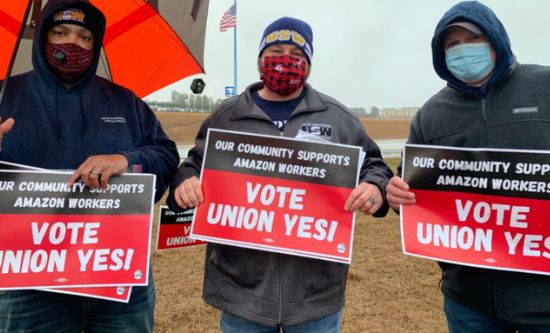
On 30 April 2022 the workers at Amazon’s JFK8 warehouse in Staten Island, New York, voted 2,654 to 2,131 in favour of the Amazon Labour Union (ALU). This is the first successful organising effort in Amazon’s history in the US. This victory, led by Christian Smalls and his black and Hispanic colleagues, could mark an historic upturn in US trade unionism which has been in sharp decline. Over 60% of hourly-paid workers at the Staten Island warehouse are black or Hispanic while most managers are white or Asian.
Chris Smalls, now ALU president, was sacked in 2020 during the Covid-19 pandemic for organising a walkout over safety. He founded the ALU in April 2021. To win against a trillion-dollar company is ‘the best feeling in the world’, he said. The workers demand longer breaks, paid time off for injured employees, a shuttle service to work and an hourly rate of $30, up from a minimum of just over $18 on offer. The borough average is $41 per hour. Amazon has an appalling safety record. The fast pace of work causes repetitive strain injuries and musculo-skeletal disorders.
Smalls tweeted that over 50 Amazon warehouses in the US have contacted the ALU. This has been a game changer. It follows the more traditional Retail, Wholesale and Department Store Union’s (RWDSU) attempt to unionise in the Bessemer warehouse in Alabama that voted 993 to 875 against unionisation. 416 ballots were challenged by the National Labor Relations Board who found the result ‘tainted’, but the challenge failed. RWDSU president Stuart Applebaum believes that current labor laws are rigged in favour of corporations. The Bessemer warehouse opened in 2020. Its 5,800 strong workforce is mostly black, mirroring the 70% black population of Bessemer.
Amazon, whose CEO Jeff Bezos is one of the richest men in the world, is the second largest employer in the US, employing over one million people, and does everything it can to keep unions out. In 2021 Amazon racked up nearly $470bn in revenue. They spent over $42m last year on consultants to persuade workers not to unionise. Overall, employers last year spent $340m on consultants according to the Economic Policy Institute. The consultants are paid around $2,500 a day. The greatest expense is legal advice about what companies can and can’t do, but fines for labour law violations are relatively low and big corporations can easily afford them.
Corporations like Amazon hold ‘captive audience’ meetings, which are mandatory, to intimidate workers. They make threats: ‘We can’t afford to keep this place open if it goes union’. They say that with healthcare, education and pension plans Amazon is a great place to work and unions are not in workers’ interests. Unions have used a ‘card check’ system, effectively a secret ballot, to protect workers from victimisation in face-to-face confrontations with their bosses. Under US law unions are entitled to recognition if a majority sign cards saying they want union representation.
Union membership in the private sector was only 6.1% in 2021, a record low, but a Gallop poll in the same year showed 68% of Americans in favour of labour unions, the highest since 1965. There have been divisions in ruling-class strategy for dealing with unions. Some have wanted to ‘kill them with kindness’: Joe Biden has encouraged unionisation. He wants to be ‘the most pro-union president in US history’. Others, like Amazon and Starbucks, want to knock them stone-dead.
Starbucks is seeing a wave of unionisation. Workers at 7,140 Starbucks locations have requested elections, some successful. A coalition of investors advised Starbucks to remain neutral because of growing public support. They found that they could still make profits at their hotel, airport and college outlets even with a unionised workforce, which tends to be more efficient, productive and loyal. But further considerations, such as loss of the freedom to change terms and conditions without bargaining with the union, danger of losing control over the workforce, rising legal costs and instinctive hatred of unions interfering in the way they run their business, combined with the growing economic crisis, has made Starbucks as anti-union as Amazon.
The Amazon workers at Staten Island face a long haul. Their strategy of grassroots organisation is especially difficult in an industry with a very high staff turnover rate. The pressures on the ALU are immense. Opportunists from the Democrats and the union bureaucracies are attempting to court Chris Smalls, inviting him to a Congressional committee alongside the likes of Bernie Sanders.
Biden wants to integrate the unions into the structure of government. He will impose ‘national sacrifice’ to block strikes to pay for the economic crisis and the enormous cost of preparing for war against Russia and China.
Victory to the ALU!
Pete Lynch




